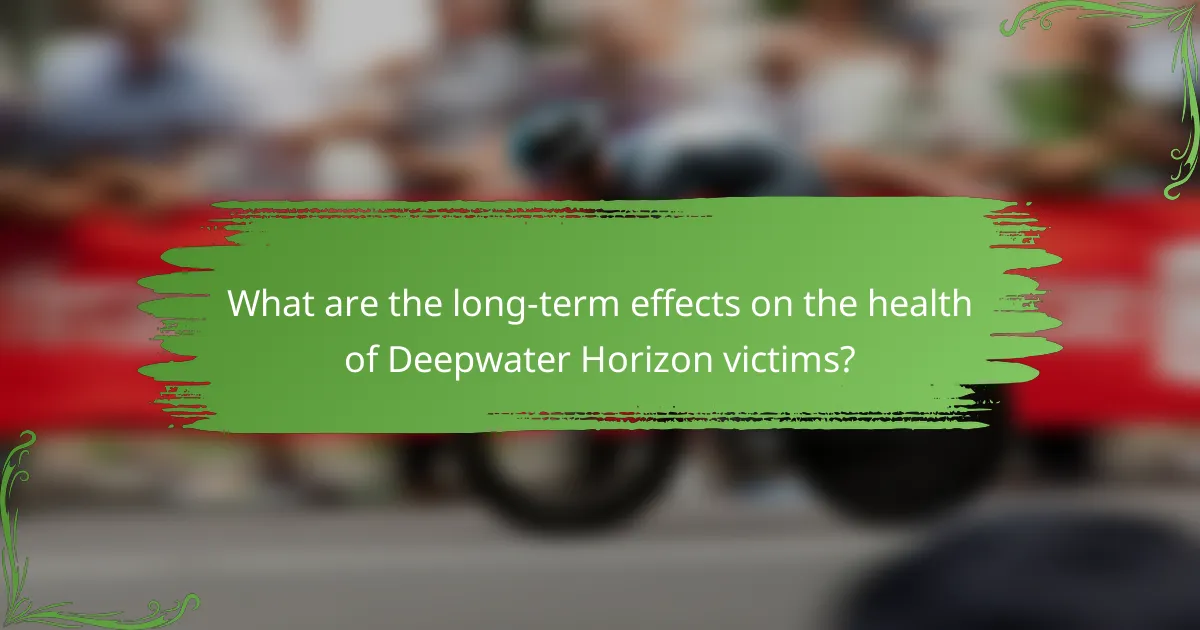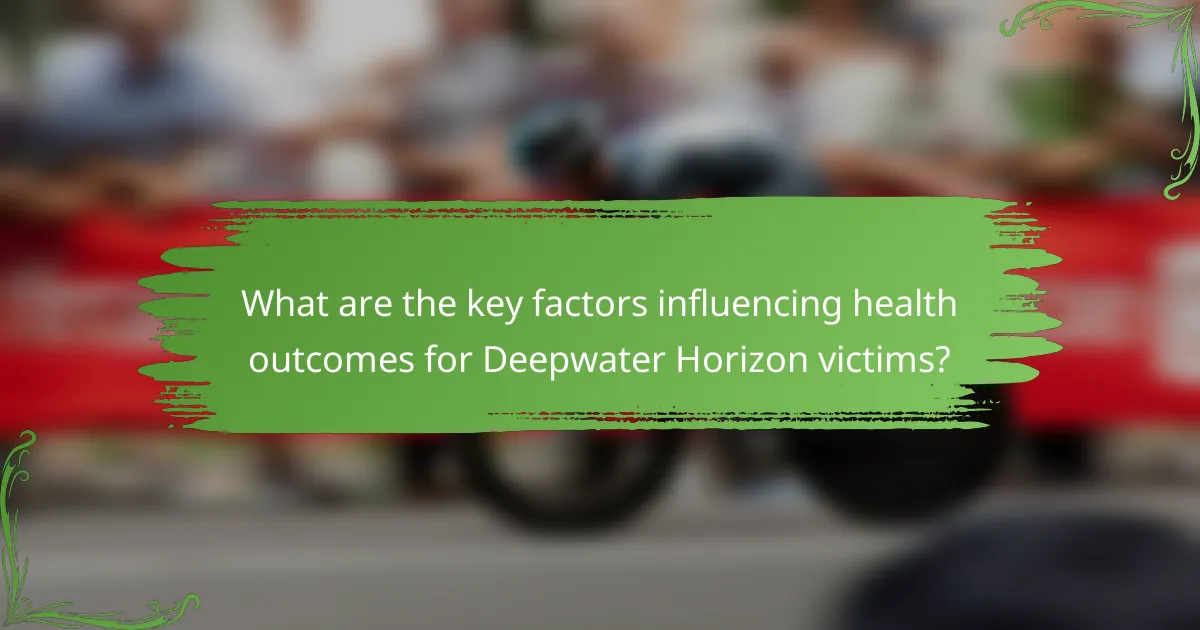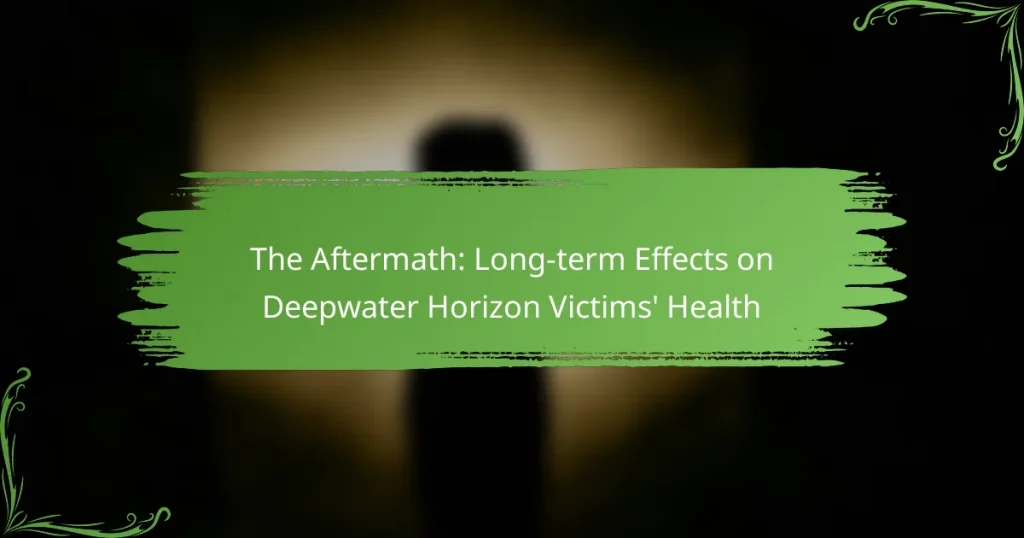The Deepwater Horizon disaster has resulted in significant long-term health effects for victims, including respiratory issues, skin conditions, and psychological impacts. Victims frequently experience chronic cough, asthma-like symptoms, skin rashes, and heightened levels of anxiety and depression due to exposure to toxic substances such as oil and dispersants. Key factors influencing these health outcomes include the nature of exposure, mental health challenges, and socioeconomic status. Ongoing health monitoring and support initiatives, such as those provided by the Gulf Coast Health Alliance and the Centers for Disease Control and Prevention, aim to address these long-term health challenges and ensure that affected individuals receive necessary care and support.

What are the long-term effects on the health of Deepwater Horizon victims?
Long-term effects on the health of Deepwater Horizon victims include respiratory issues, skin conditions, and psychological effects. Many victims report chronic cough and asthma-like symptoms due to exposure to toxic fumes and chemicals. Skin rashes and irritations have also been documented among those who came into contact with contaminated water and oil. Additionally, studies indicate an increased prevalence of anxiety and depression among affected individuals. Research published in the journal Environmental Health Perspectives highlights these health issues and links them to the disaster. The long-term monitoring of victims is essential to fully understand the lasting impacts.
How did the Deepwater Horizon disaster impact the health of individuals involved?
The Deepwater Horizon disaster significantly impacted the health of individuals involved. Many workers experienced respiratory issues due to exposure to toxic fumes. Reports indicated a rise in mental health disorders among those affected. Symptoms included anxiety, depression, and post-traumatic stress disorder. Additionally, some individuals reported skin conditions from contact with oil and dispersants. Long-term studies revealed elevated rates of certain cancers in cleanup workers. The Centers for Disease Control and Prevention (CDC) noted these health concerns in their assessments. Overall, the disaster led to lasting health consequences for many involved.
What specific health conditions have been reported among victims?
Victims of the Deepwater Horizon disaster have reported various health conditions. Commonly reported conditions include respiratory issues, such as asthma and chronic bronchitis. Skin disorders, including rashes and irritations, have also been frequently noted. Neurological symptoms, like headaches and cognitive impairments, have been documented among affected individuals. Additionally, gastrointestinal problems, including nausea and abdominal pain, have been reported. Mental health issues, such as anxiety and depression, are prevalent among victims. Studies have indicated that these health conditions are linked to exposure to toxic substances during and after the spill.
How do these health conditions vary among different groups of victims?
Health conditions among Deepwater Horizon victims vary significantly across different demographic groups. Research indicates that age, gender, and socioeconomic status influence health outcomes. For instance, older victims report higher instances of chronic respiratory issues. Women have shown increased rates of anxiety and depression compared to men. Additionally, lower-income individuals often experience more severe health complications due to limited access to healthcare. A study by the CDC highlighted that specific health conditions, such as skin and gastrointestinal problems, were more prevalent in communities closest to the spill. These variations underscore the need for targeted health interventions.
Why is it important to study the long-term health effects of the Deepwater Horizon disaster?
Studying the long-term health effects of the Deepwater Horizon disaster is crucial for understanding its lasting impact on affected communities. The disaster released millions of gallons of oil and toxic chemicals into the Gulf of Mexico. This exposure can lead to chronic health issues, including respiratory problems and cancer. Longitudinal studies can identify specific health trends over time. Research can inform public health policies and disaster response strategies. Understanding these effects also aids in providing necessary medical care to victims. The National Institute of Environmental Health Sciences has conducted studies linking oil spill exposure to adverse health outcomes. This data is essential for future preventive measures and health interventions.
What insights can be gained from understanding these health effects?
Understanding the health effects of the Deepwater Horizon disaster provides critical insights into environmental health impacts. It reveals the link between exposure to oil and chemical dispersants and long-term health issues. Victims have reported respiratory problems, neurological disorders, and psychological effects. This data emphasizes the need for ongoing health monitoring for affected populations. Additionally, it highlights the importance of regulatory measures to prevent future incidents. Research shows that environmental disasters can lead to chronic health conditions, underscoring the significance of preparedness and response strategies. Understanding these effects can inform public health policies and improve responses to similar events in the future.
How can this knowledge influence future disaster response and prevention?
Understanding the long-term health effects on Deepwater Horizon victims can significantly influence future disaster response and prevention. This knowledge highlights the importance of immediate medical assessments and ongoing health monitoring for affected individuals. It emphasizes the need for tailored healthcare strategies that address specific health risks associated with exposure to toxic substances. Studies have shown that early intervention can mitigate long-term health issues, as seen in the aftermath of similar disasters. Furthermore, this knowledge can guide the development of better emergency response protocols that prioritize mental health support. By learning from past incidents, response teams can improve training and preparedness for future environmental disasters. This proactive approach can ultimately reduce the health burden on communities affected by similar events.

What are the key factors influencing health outcomes for Deepwater Horizon victims?
Key factors influencing health outcomes for Deepwater Horizon victims include exposure to toxic substances, mental health impacts, and socioeconomic status. Victims were exposed to oil, dispersants, and other chemicals, which can lead to respiratory issues and skin conditions. The psychological effects of the disaster, such as PTSD and anxiety, also play a significant role in health outcomes. Socioeconomic factors, including access to healthcare and financial stability, further affect recovery and health management. Studies indicate that these elements collectively contribute to the long-term health challenges faced by the victims.
How do exposure levels to toxic substances affect health outcomes?
Exposure levels to toxic substances significantly impact health outcomes. Higher exposure levels can lead to acute and chronic health issues. For example, individuals exposed to benzene may experience respiratory problems and increased cancer risk. Studies have shown that prolonged exposure to volatile organic compounds can lead to neurological disorders. The Deepwater Horizon oil spill resulted in various health complaints among affected individuals. Research indicates that clean-up workers reported higher rates of headaches, dizziness, and skin rashes. Additionally, the Centers for Disease Control and Prevention has documented long-term effects in populations exposed to oil spills. These findings underscore the link between toxic exposure levels and adverse health effects.
What types of toxic substances were present during the Deepwater Horizon spill?
The Deepwater Horizon spill released several types of toxic substances. These include crude oil, which contains numerous harmful compounds. Polycyclic aromatic hydrocarbons (PAHs) are among the most toxic components found in the oil. Volatile organic compounds (VOCs) were also present, contributing to air pollution. Heavy metals, such as mercury and lead, were detected in the water and sediment. These substances pose significant health risks to the environment and human health. Studies have shown that exposure to these toxins can lead to long-term health effects. The Environmental Protection Agency (EPA) reported on the toxicological impacts of these substances following the spill.
How does the duration of exposure correlate with health issues?
The duration of exposure to harmful substances correlates significantly with health issues. Prolonged exposure increases the risk of chronic conditions. For instance, studies show that individuals exposed to toxic chemicals for extended periods face higher rates of respiratory diseases. Research from the National Institute of Environmental Health Sciences indicates that long-term exposure can lead to neurological disorders. The Deepwater Horizon oil spill victims experienced various health problems linked to the duration of exposure to oil and dispersants. A study published in the Journal of Occupational and Environmental Medicine found a direct relationship between exposure duration and the prevalence of symptoms such as headaches and respiratory issues among exposed workers. Thus, the longer the exposure, the greater the likelihood of developing serious health complications.
What role does psychological impact play in the long-term health of victims?
Psychological impact significantly affects the long-term health of victims. Emotional distress can lead to chronic conditions such as anxiety and depression. These mental health issues often manifest physically, resulting in symptoms like fatigue and pain. Victims may also experience post-traumatic stress disorder (PTSD), which can further complicate recovery. Research shows that individuals with PTSD are at a higher risk for cardiovascular disease. Additionally, psychological trauma can lead to unhealthy coping mechanisms, such as substance abuse. This can exacerbate existing health problems and create new ones. The interplay between mental and physical health highlights the importance of addressing psychological needs in recovery efforts.
How have mental health issues manifested among Deepwater Horizon victims?
Mental health issues among Deepwater Horizon victims have manifested primarily as anxiety, depression, and post-traumatic stress disorder (PTSD). Many individuals reported feeling overwhelmed by the disaster’s impact on their livelihoods and communities. Studies indicate that approximately 25% of affected individuals experienced significant psychological distress following the spill. The National Institute of Environmental Health Sciences highlighted that the stress from economic instability contributed to these mental health challenges. Additionally, survivors faced ongoing feelings of helplessness and fear regarding their future. The psychological effects were exacerbated by the prolonged recovery period and inadequate access to mental health resources.
What support systems are available for addressing these psychological effects?
Support systems available for addressing psychological effects include mental health services, community support groups, and crisis intervention programs. Mental health services provide professional counseling and therapy to individuals affected by trauma. Community support groups offer peer support and shared experiences, fostering a sense of belonging. Crisis intervention programs assist individuals in immediate distress, providing urgent care and resources. Research indicates that access to these support systems can significantly improve mental health outcomes for disaster victims. For instance, a study published in the Journal of Traumatic Stress highlights the effectiveness of community support in mitigating PTSD symptoms among disaster survivors.

What are the ongoing health monitoring and support initiatives for victims?
Ongoing health monitoring and support initiatives for victims of the Deepwater Horizon disaster include medical assessments and psychological support programs. The Gulf Coast Health Alliance provides regular health screenings to track long-term health effects. Additionally, the National Institute of Environmental Health Sciences conducts research to understand health impacts. The Centers for Disease Control and Prevention offers resources and educational materials for affected communities. Local health departments also organize mental health services to address trauma. These initiatives aim to ensure victims receive necessary care and support.
How are health monitoring programs structured for Deepwater Horizon victims?
Health monitoring programs for Deepwater Horizon victims are structured to assess and manage health outcomes related to the disaster. These programs typically include medical evaluations, health screenings, and ongoing monitoring of symptoms. They aim to identify health issues linked to exposure to oil and dispersants. Participants receive regular check-ups and assessments to track changes in their health status over time. Data collected from these evaluations helps in understanding the long-term impacts of the disaster. Programs are often coordinated by public health agencies and research institutions. The National Institute of Environmental Health Sciences has been involved in these efforts. Their studies provide evidence of health risks associated with the incident, reinforcing the need for structured monitoring.
What types of health screenings are provided to victims?
Victims are provided with various types of health screenings. These screenings include respiratory assessments for lung function and exposure-related conditions. Blood tests are conducted to check for toxic substances and overall health indicators. Mental health evaluations are also offered to address psychological impacts. Additionally, screenings for skin conditions related to chemical exposure are available. Regular follow-ups ensure ongoing monitoring of health issues. These screenings help identify and manage long-term health effects. Research indicates that early detection improves outcomes for affected individuals.
How effective are these programs in addressing long-term health concerns?
These programs are moderately effective in addressing long-term health concerns for Deepwater Horizon victims. They provide necessary medical care and psychological support. Research indicates that early intervention improves health outcomes. For instance, a study by the National Institute of Environmental Health Sciences found that community health programs reduced anxiety and depression among affected individuals. Additionally, ongoing monitoring helps manage chronic conditions. Overall, while challenges remain, these programs play a crucial role in mitigating health issues stemming from the disaster.
What resources are available for victims seeking medical help?
Victims seeking medical help can access several resources. They can contact the National Response Center for immediate assistance. Local health departments also offer support for medical needs related to environmental disasters. The Centers for Disease Control and Prevention provides information on health risks and resources. Additionally, the Gulf Coast Health Alliance offers specialized services for affected individuals. Non-profit organizations, such as the Red Cross, provide emergency medical services and mental health support. These resources are designed to assist victims in navigating their health challenges following the Deepwater Horizon incident.
How can victims access medical care for their conditions?
Victims can access medical care for their conditions through various channels. They should first contact local healthcare providers or hospitals for immediate treatment. Many victims may qualify for assistance through government programs or non-profit organizations dedicated to disaster relief. Additionally, victims can seek support from legal entities that specialize in environmental disasters. These organizations often provide resources and referrals for medical care. According to the Centers for Disease Control and Prevention, victims of environmental disasters may experience long-term health effects that require ongoing medical attention. Accessing care early can improve health outcomes and ensure that victims receive necessary treatment for conditions related to the Deepwater Horizon disaster.
What organizations provide support to Deepwater Horizon victims?
Several organizations provide support to Deepwater Horizon victims. The Gulf Coast Claims Facility (GCCF) was established to handle claims from individuals and businesses affected by the oil spill. The Deepwater Horizon Medical Benefits Settlement offers medical benefits to those impacted by the disaster. Additionally, the National Institute of Environmental Health Sciences (NIEHS) conducts research and provides resources related to health effects from the spill. The Louisiana Bucket Brigade advocates for affected communities and offers support for health-related issues. These organizations play crucial roles in addressing the needs of victims and facilitating recovery efforts.
What practical steps can Deepwater Horizon victims take to manage their health?
Deepwater Horizon victims can take several practical steps to manage their health. First, they should seek regular medical check-ups to monitor any health issues. Early detection can lead to better outcomes. Second, they should document any symptoms or health changes. This information is crucial for healthcare providers. Third, victims should consider mental health support. Counseling can help address psychological impacts. Fourth, they should stay informed about potential long-term health effects related to the spill. Understanding risks can aid in proactive health management. Additionally, joining support groups can provide emotional support and shared resources. Lastly, victims should maintain a healthy lifestyle, including a balanced diet and regular exercise. These steps can contribute to overall well-being and health management.
The primary entity of this article is the long-term health effects experienced by victims of the Deepwater Horizon disaster. The article provides a comprehensive overview of various health conditions reported by these victims, including respiratory issues, skin disorders, and mental health challenges such as anxiety and depression. It highlights the significance of ongoing health monitoring, the impact of exposure to toxic substances, and the role of socioeconomic factors in health outcomes. Additionally, the article discusses available support systems and resources for victims, emphasizing the importance of understanding these health effects for future disaster response and prevention strategies.


